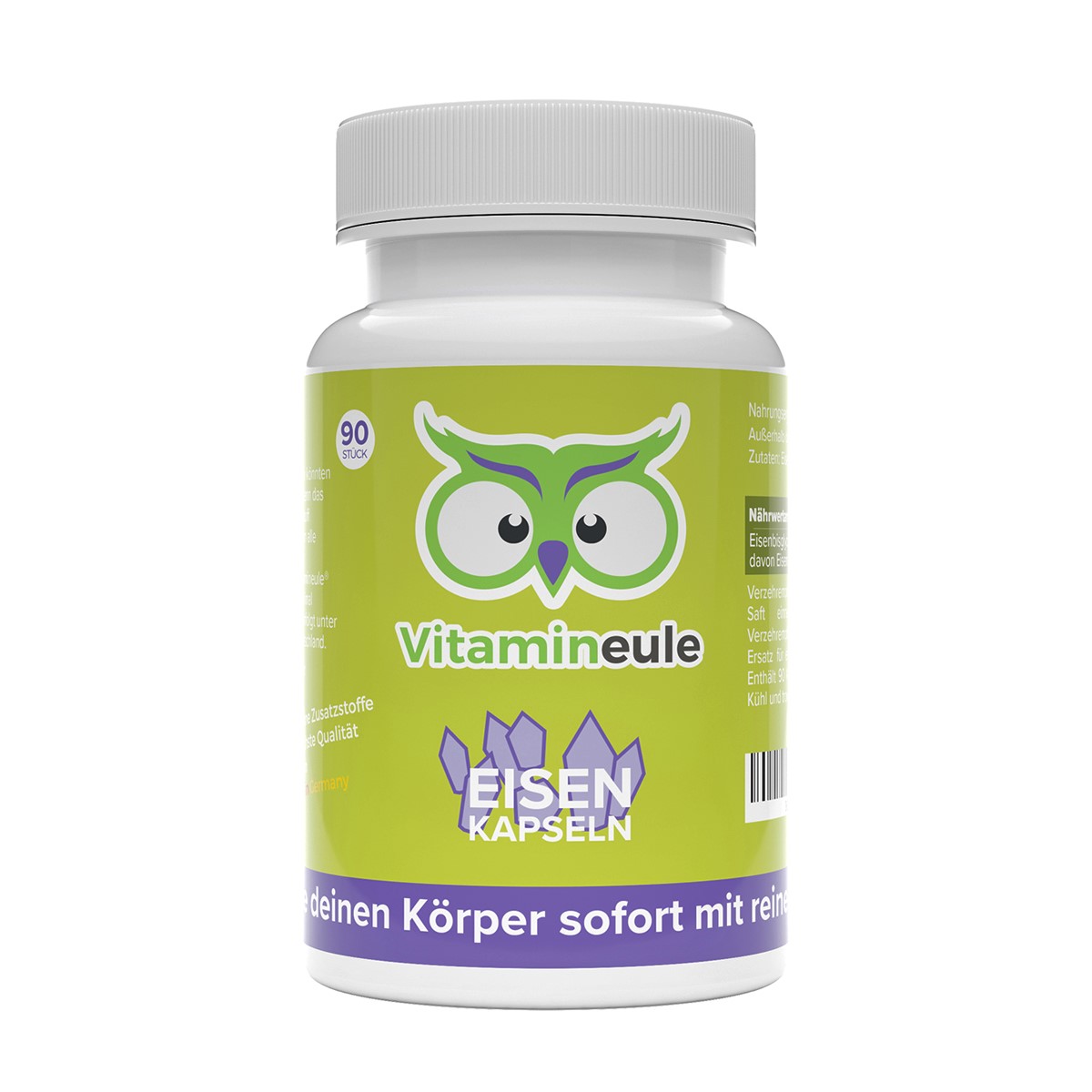

Team vitamin owl
Questions, wishes or suggestions? Just contact us by email or on Facebook.
1. can iron be stored in the body?
Many people wonder if iron can be stored in the body. The answer is yes! The body can store about 3-6 grams of iron. Iron is absorbed by the human body through food. This includes animal, as well as plant foods. Especially meat contains a lot of iron. However, meat is also divided into red and white meat. Red meat includes veal, pork, lamb, beef and mutton. White meat, on the other hand, consists of chicken meat, turkey meat, goose meat, duck meat and rabbit meat. Red meat contains significantly larger amounts than white meat. HEM iron is found in animal foods. It can be better absorbed by the body and contains more iron than fruits and vegetables. Iron is stored in the liver, bone marrow, spleen and muscles.
2 The daily requirement of iron
The German Nutrition Society (DGE) recommends a daily iron intake of 10 to 15 mg for an adult. Children should consume about 10 mg of iron per day. Pregnant and breastfeeding women are recommended higher intakes, as they have to take care of the unborn child. They should take in about 20 to 30 mg of iron a day. A visit to the doctor can determine if one is suffering from an iron deficiency. Once it has been determined by the medical professional that one is suffering from an iron deficiency, one should increase iron levels by changing one's diet or taking supplements. When supplementing iron, one can choose between iron capsules and iron tablets. It is important to have another test with a doctor after the change. The iron values should be compared regularly.
How can I recognize an iron deficiency?
If iron is deprived from the body in the long term or the iron metabolism is disturbed under certain circumstances, an iron deficiency can occur. If there is too little iron, the body cannot supply itself with sufficient oxygen and the energy metabolism only works to a limited extent. The typical symptoms of iron deficiency are brittle nails and hair, dizziness and headaches. Those affected also often have to struggle with fatigue and difficulty concentrating. It is not uncommon for those affected to experience a decline in attention, resulting in memory problems. An iron deficiency is often noticeable by pallor in the face, and depressive moods can also occur as a result. Due to the fact that the human organism is no longer supplied with sufficient oxygen in the case of iron deficiency, it is not uncommon for shortness of breath to occur. People with iron deficiency often report an increased susceptibility to infections, which is due to the fact that the immune system can no longer function optimally in the case of iron deficiency.
4. iron in the form of dietary supplements
Anyone who wants to increase an iron level that is too low with a dietary supplement should definitely pay attention to the form of the active ingredient and its origin. Iron bisglycinate is particularly suitable for increasing iron levels. It is very well tolerated and is utilized by the body to a high degree. Likewise, the preparation should not contain any chemical additives such as magnesium stearate or microcrystalline cellulose. If you buy a preparation from Germany, you can be sure that the product has also been produced safely and is of high quality.
Our recommendation:
Vitamineule® Iron Capsules
In our online store you will find our iron capsules from Vitamineule®, which are completely free of artificial additives. Vitamineule® Iron Capsules contain 56mg of pure iron per capsule in the effective form iron bisglycinate. Each can contains 90 caps ules.In addition to fast & free shipping, we offer a voluntary six-month return guarantee on all products.
5. conclusion: Can iron be stored in the body?
In this blog you will learn more about whether iron can be stored in the human organism. Iron is commercially available in the form of iron capsules and iron tablets. Both forms are easy to use and enter the circulation quickly. For optimal intake, you can take water or juice. One should always adhere to the recommended daily amount and discuss any changes with a physician.
Further reading:
- Management of Iron-Deficiency Anemia in Inflammatory Bowel Disease.
- Management of Iron Deficiency Anemia
- Disclaimer and General Medical Notice: The content presented in our health blog is for neutral information and general education purposes only. It does not constitute a recommendation or advertisement of any diagnostic method, treatment or drug described or mentioned. The text does not claim to be complete, nor can the timeliness, accuracy and balance of the information presented be guaranteed. The text is in no way a substitute for professional advice from a physician or pharmacist, and it should not be used as a basis for independent diagnosis and initiation, modification, or termination of treatment of any disease. Always consult your trusted physician for any health questions or complaints. Mach Dich Wach! GmbH and the authors accept no liability for any inconvenience or damage resulting from the use of the information presented here.

